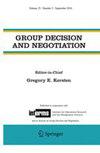作为社会偏好函数的合作对策的广义Shapley值
IF 2.5
4区 管理学
Q2 MANAGEMENT
引用次数: 0
摘要
本文章由计算机程序翻译,如有差异,请以英文原文为准。
The Generalized Shapley Value of Cooperative Games as a Social Preference Function
求助全文
通过发布文献求助,成功后即可免费获取论文全文。
去求助
来源期刊

Group Decision and Negotiation
Multiple-
CiteScore
5.70
自引率
6.70%
发文量
32
期刊介绍:
The idea underlying the journal, Group Decision and Negotiation, emerges from evolving, unifying approaches to group decision and negotiation processes. These processes are complex and self-organizing involving multiplayer, multicriteria, ill-structured, evolving, dynamic problems. Approaches include (1) computer group decision and negotiation support systems (GDNSS), (2) artificial intelligence and management science, (3) applied game theory, experiment and social choice, and (4) cognitive/behavioral sciences in group decision and negotiation. A number of research studies combine two or more of these fields. The journal provides a publication vehicle for theoretical and empirical research, and real-world applications and case studies. In defining the domain of group decision and negotiation, the term `group'' is interpreted to comprise all multiplayer contexts. Thus, organizational decision support systems providing organization-wide support are included. Group decision and negotiation refers to the whole process or flow of activities relevant to group decision and negotiation, not only to the final choice itself, e.g. scanning, communication and information sharing, problem definition (representation) and evolution, alternative generation and social-emotional interaction. Descriptive, normative and design viewpoints are of interest. Thus, Group Decision and Negotiation deals broadly with relation and coordination in group processes. Areas of application include intraorganizational coordination (as in operations management and integrated design, production, finance, marketing and distribution, e.g. as in new products and global coordination), computer supported collaborative work, labor-management negotiations, interorganizational negotiations, (business, government and nonprofits -- e.g. joint ventures), international (intercultural) negotiations, environmental negotiations, etc. The journal also covers developments of software f or group decision and negotiation.
 求助内容:
求助内容: 应助结果提醒方式:
应助结果提醒方式:


